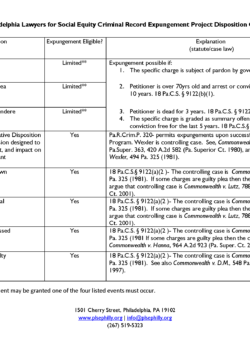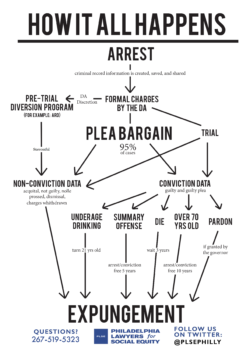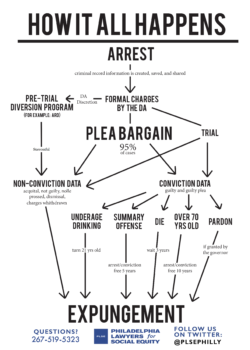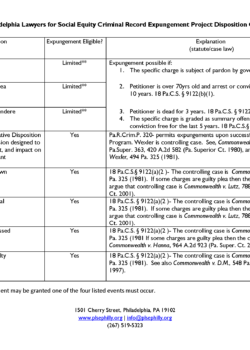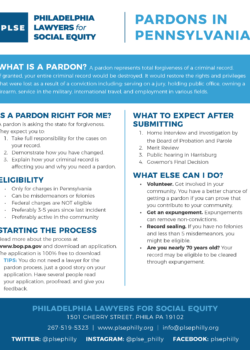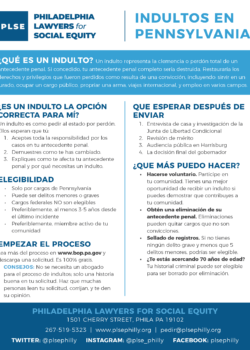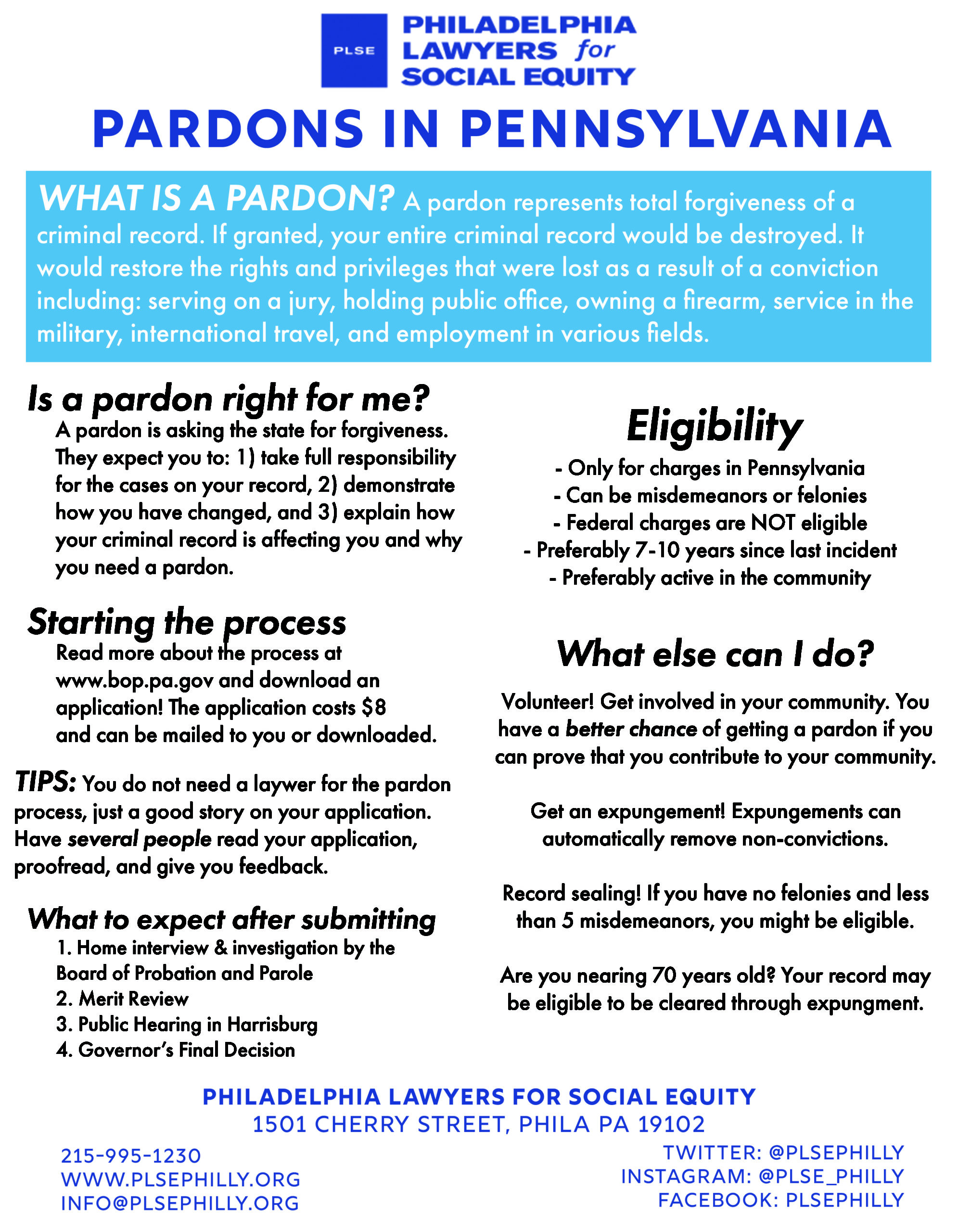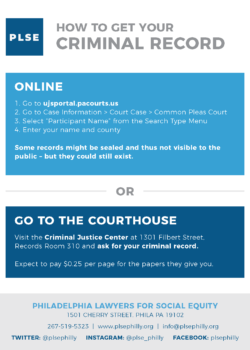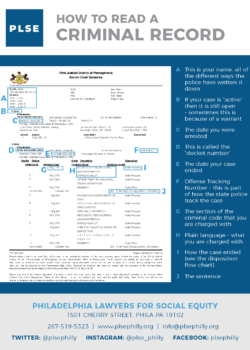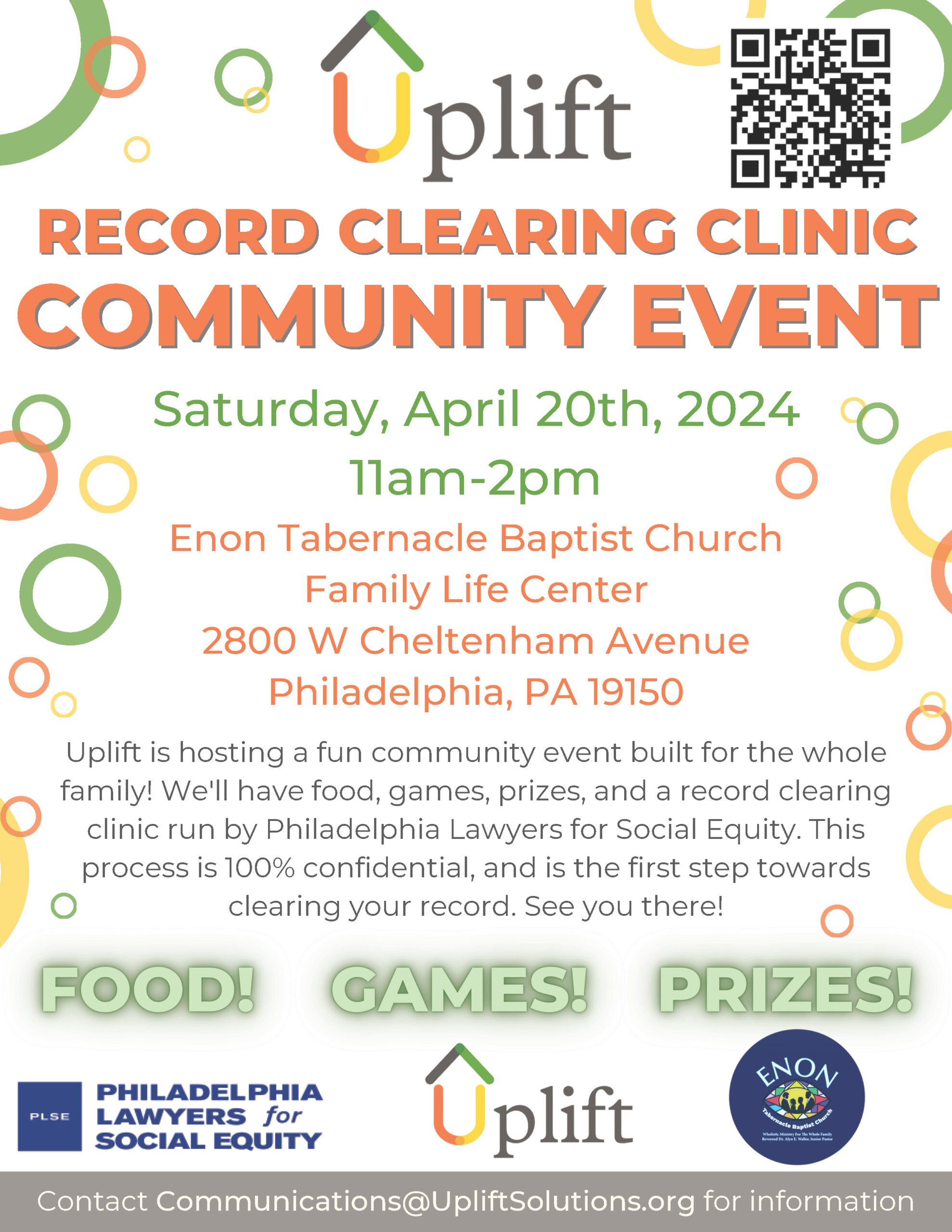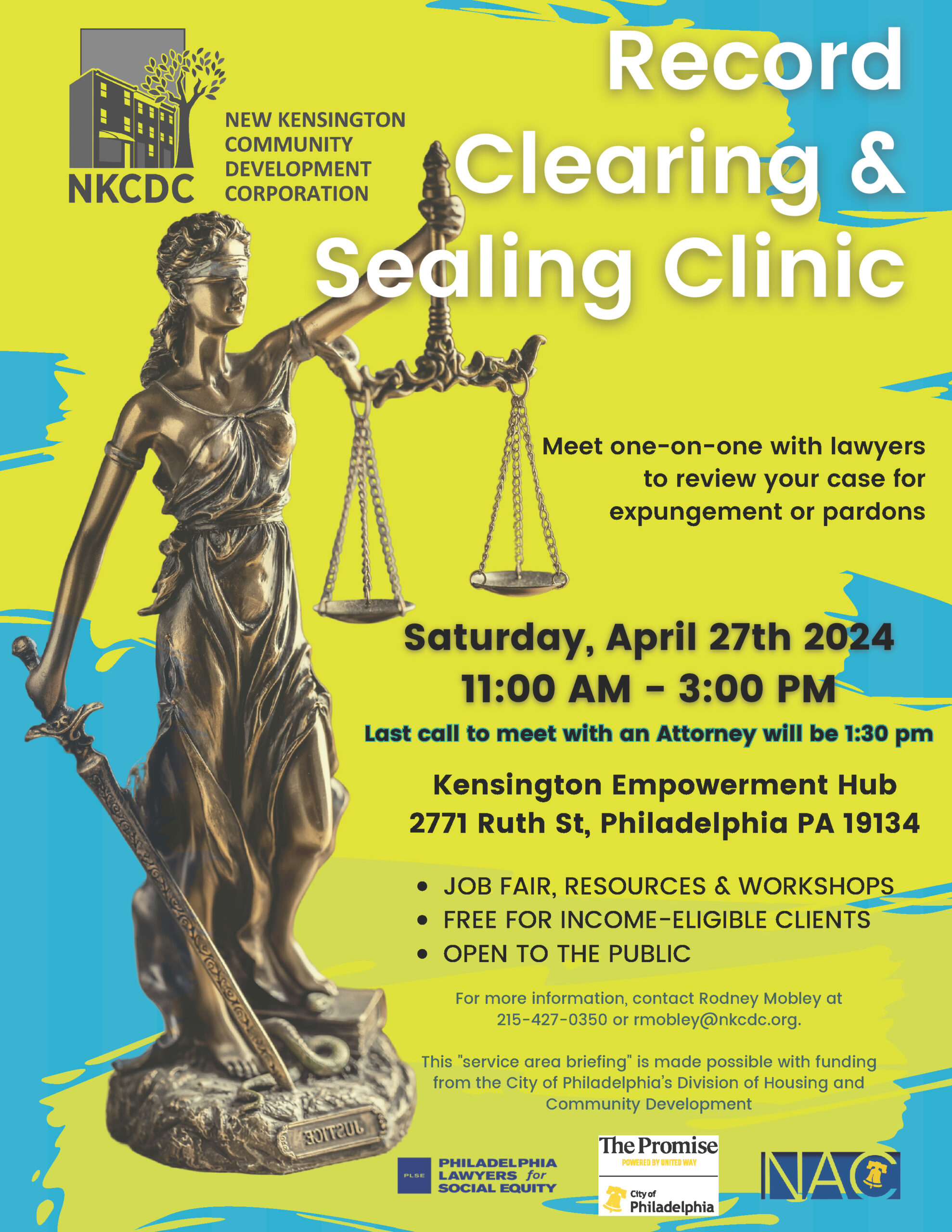JUMP TO INFO BY TOPIC
It’s important to remove those charges because people like employers, landlords, and the police can often see them on your record, even if they were dismissed or withdrawn.
Once you file, the district attorney’s office might object to your expungement petition and ask for a hearing before a judge to decide if you should be given an expungement. Sometimes they do not object, and you never have to go to court. If they do, there will be a hearing.
At the hearing, the judge will balance your right to be free from the harm that the record causes you, against the Commonwealth’s interest in keeping the record, and make a decision.
If your expungement is granted, the court will provide you or your attorney copy of the signed expungement order for your records. They will also send a copy to the state police and Philadelphia police ordering them to destroy the information. Finally, the police send letters to you or your attorney confirming that they have destroyed the information.
The only other way to get a conviction expunged is if it’s for a summary, or ticket-level offense, or if you are over 70 years old and have not been arrested for 10 years. Other than that, a pardon is the only way to get convictions removed in Pennsylvania right now.
It helps if you can show the Board of Pardons ways that you have worked to change yourself as a person. This could include showing that you have given back to your community in some way, perhaps by volunteering or by serving in your religious community.
Most importantly, the Board of Pardons will want to see that you accept responsibility for your crimes, are remorseful, and are a different person now. There are many ways to demonstrate this.
For more information, watch videos about the pardon process in our Video Library.
First, you submit an application to the Board of Pardons. You can download it online at bop.pa.gov.
Next, the Board begins review and investigation. You may be contacted by the Office of Probation and Parole for an in-home interview so they can get to know you better.
After your interview, you will be invited to Harrisburg, PA for a hearing with the Board of Pardons. Then, if your application is recommended, the Governor gives final approval. When approved, you can then file for an expungement to remove those charges from your record.
June 2020:
The Parole Agent Interview (shared by a current pardon applicant) Before the Board of Pardons decides whether anyone gets a hearing on a pardon application, the applicant has to be interviewed by a parole agent. In May, one of our clients had his interview. Here are some key “lessons learned” he shared with us: The letter told me to expect the interview within 3-4 months; it actually took 5 months. The interviewer called me on the phone to schedule the review, and that made it easy for us to coordinate. The interview was done by phone, and lasted about 50 minutes. The agent was professional and respectful; his style was not confrontational – almost conversational – and I found it easy to discuss the details of my case with him. The questions that he asked were in line with the form they sent out. Since I had prepared the information ahead of time, I was able to give him the information he wanted. On some questions, I could not remember the exact information, and he told me that was “okay.” My recommendations: Get your information ready ahead of time. I got the papers ready and had answers in a document that I had my Pardon Coaches (students from Penn Law’s Pardon Project) help me put together. Practice ahead of time. I had done a mock interview two days before the real one that got me ready and served to keep me sharp. The fact of being prepared really helped me be confident going in and stay focused during the interview.
May 2020:
Make a PDF! Because of Covid-19, the Board of Pardon has asked that people hold off mailing in their pardon applications until after the Governor says it’s okay for government workers to come back to their offices. But that doesn’t mean to stop working on it – in fact, take advantage of the time to finalize your pardon application!!! If you have questions, email us at info@plsephilly.org . And, if you can, make a PDF copy of your complete application. This will help you later when it comes time for your interview with the parole agent – and it might speed up the processing time!
March 2020:
“Clean Slate” Does NOT Clean Slates! “Clean Slate” is the remarkable law, spearheaded by Community Legal Services, that is removing from the public database all arrests that did not end in convictions and certain convictions that are at least 10 years old. While it’s no longer possible for most employers and credit agencies to see those criminal history records on-line, those records still exist and can be easily accessed by the police, prosecutors, businesses using FBI background checks, and others. To get convictions REALLY erased from your record requires a pardon; and a pardon application requires you to disclose your complete criminal history, including the things hidden by Clean Slate. Go to Room 310 of the Criminal Justice Center and ask for your “SECURE” court summary. Once you get it, take it one of PLSE’s expungement clinics or pardon workshops, where we can help you figure out what your options are. Check here for the next one.
January 2020:
Don’t Wait! File your pardon application ASAP! The current Board of Pardons has been recommending that the Governor approve two-thirds of the pardon applications that are filed! It takes approximately two years from the time you file your application to when you’ll get a hearing before the Board. Two members of the Pardons Board – the Lt. Governor and the Attorney General – may run for different offices, so they may not be on the Board three years from now. Gov. Wolf has been granting over 95% of all pardon recommendations he’s received, and he stops being governor on January 17, 2023. You can always file changes to your application and submit additional materials. So do NOT wait ANY longer! Get your application completed and filed ASAP. Click here to watch a video where people who have been through the process – including the current Secretary of the Board of Pardons – talk about how a pardon can change your life. Attend a Pardon Workshop to get free information and insights about how to complete the form and tell the best story you can.
December 2019:
No Photo Required! One of the long-standing requirements for a pardon application that PLSE has challenged is that applicants must attach a color head shot. Does someone’s face tell you whether or not they are truly rehabilitated? When we brought this issue to the attention of the Board of Pardons Secretary Brandon Flood, he responded by eliminating the requirement! The application form was revised on November 15th. If you are working on the old form, you do not have to start over – just don’t worry about the photo. Thank you, Secretary Flood!
November 2019:
Don’t Wait! Get Started Now! In its soon-to-be released study, the Economy League has documented that, over the past 5 years, anyone who files an application has better than 50-50 chance of getting a pardon – but more recently, the facts are even more amazing: at their last hearing, the Board of Pardons voted to support almost 90% of all applications that it heard, and Governor Wolf is accepting over 95% of the Board’s recommendations. Simply put: there has never been a better time to apply for a pardon! If you have a conviction on your record and have several years of good citizenship to prove that you’ve changed, download the (free) application form , and get started on it now. To get tips and help you can use to make your application better, come to a (free) Pardon Workshops – we’re now holding them regularly in a growing number of neighborhoods. Check our schedule for the next ones.
October 2019:
What’s a “Representative”? The newly-revised Application for Clemency asks for information about a “Representative.” Essentially, this is asking for a secondary or emergency contact in case the Board of Pardons is unable to reach an applicant. This “Representative” can be a lawyer, spouse, family member, close friend, or anyone else that you stay in touch with. Be sure to ask them if they can be listed on the application and let them know why it’s important: the pardon process can take two years sometimes and it’s important to have a backup.
August 2019:
Getting the Most from PLSE’s Services. As a result of the new Clean Slate law, the general public is no longer able to view a complete criminal history record online. You can’t see your record anymore, and neither can PLSE. The only way that PLSE can give you complete legal advice is by having your full history. How can you get a copy? Go to Room 310 of the Criminal Justice Center (13 th and Filbert Street) with a government photo ID and ask for a copy of the “secure court record” and the “docket” in every case in which you were a defendant. While you are there: be sure to go down to the basement level and ask for a copy of how much money you still owe in court fines or fees. Bring your court documents to the intake session and we will walk you through them.
July 2019:
Pardon Applications and Juvenile Records. For over a year, PLSE has been arguing with the Board of Pardons that they should stop asking applicants about their juvenile records, which enters that information on to the public record. Not only are these cases often decades old, but the law says they are supposed to be confidential! Although we have not yet succeeded in removing this question from the application, the Board has agreed that it does not need to know about any criminal record that has been expunged. So: if you believe (even if you’re not sure) you have a juvenile record (even an arrest), call the Defender Association juvenile expungement hotline at 267-765-6770. If your juvenile record can be expunged, they should be able to help you.
Right now, the full pardon process takes anywhere from 2-5 years from the time they receive your application until you have a hearing with the Board of Pardons. The process takes this long because you are asking the State of Pennsylvania for forgiveness of your criminal record and a full restoration of your rights, so the Board of Pardons is thorough in their review of applications.
Can PLSE help with my pardon?
Yes! If you would like to become a client with PLSE for pardon services, click here.
Do I need a lawyer for a pardon?
No, you do not need a lawyer to file a pardon or during the public hearing in Harrisburg. Lawyers are great storytellers and can help you prepare your application, and if you work with PLSE, we’ll help every step of the way.
ONLINE
You may be able to look up your criminal record using the court’s website at https://ujsportal.pacourts.us/DocketSheets/CP.aspx For “Search Type” select “Participant Name” then fill in your name and the county where you remember being arrested.AT THE COURT HOUSE
For Philadelphia cases you can go to 1301 Filbert Street (CJC) and visit room 310. Ask for a copy of your “secure court summary”. You should expect to pay .25 per page.If you plan to apply for a pardon, you can let the people working in the record room know that and they will help you collect the other important information.
IF YOU CAN’T FIND ANYTHING
You may also order your individual Access and Review Criminal Record Check (SP4-170) from the Pennsylvania State Police. You can do so by mailing in a request form. You must include a copy of a government issued photo ID and a certified check or money order in the amount of $20.For more information, click here to visit the Pennsylvania State Police website.
Sealing
Sealing can hide your criminal record from public view. It is available for Pennsylvania records that did not result in conviction as well as some misdemeanor convictions. Contact an attorney at PLSE for information if you are interested in sealing.
Expungement
An expungement will delete the criminal record entirely. It is generally available to all records that did not result in a conviction.
Pardon
A pardon is a process where you ask the governor to forgive your crime after you have been convicted.
Vacatur
If your criminal record is related to surviving sex trafficking, then you may be able to have the record cleared with a process called Vacatur. More information can be found at cseinstitute.org.
If you have a juvenile record in Philadelphia then you may call the Public Defender Juvenile Expungement Hotline at 267-765-6770.
If you have a case in Delaware, Bucks, or Montgomery county then you may contact Legal Aid of Southeastern PA at lasp.org
You can report violations here.
For more information, click here.
The employer must notify the employee in writing if the decision not to hire is based in whole or in part on a criminal history.
Contact Us
(267) 519-5323
info@plsephilly.org
